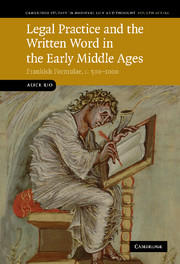Book contents
- Frontmatter
- Contents
- List of tables
- Acknowledgements
- List of abbreviations
- INTRODUCTION
- Part I Formulae, Charters and the Written Word
- Part II Inventory of the Evidence
- 3 DEFINING THE CORPUS
- 4 CATALOGUE OF THE COLLECTIONS
- Part III Formulae as a Historical Source: Limits and Possibilities
- CONCLUSION
- Appendix A handlist of manuscripts
- Bibliography
- Index
- Manuscript Index
3 - DEFINING THE CORPUS
Published online by Cambridge University Press: 14 August 2009
- Frontmatter
- Contents
- List of tables
- Acknowledgements
- List of abbreviations
- INTRODUCTION
- Part I Formulae, Charters and the Written Word
- Part II Inventory of the Evidence
- 3 DEFINING THE CORPUS
- 4 CATALOGUE OF THE COLLECTIONS
- Part III Formulae as a Historical Source: Limits and Possibilities
- CONCLUSION
- Appendix A handlist of manuscripts
- Bibliography
- Index
- Manuscript Index
Summary
FORMULAE
The first step in finding an appropriate way of dealing with these texts is to find a working definition for them as a distinct genre. A formula is a model document – so far, so good. But how exactly is such a model to be recognised? And what sorts of document could it involve? These questions are difficult, because formulae were apparently not perceived as a genre in their own right during the medieval period. Although formulae and charters, for instance, differ in highly significant ways as historical sources, they do not seem to have been distinguished very strongly by contemporaries. The word ‘formula’ itself was only adopted to refer systematically to models as distinct from actual documents for the convenience of modern scholars; early medieval scribes normally referred to both as cartae, which suggests that they did not conceptualise them as fundamentally different.
The word formula occurs for certain only once in our corpus, in the title to the first book of Marculf. Even there, it is likely that formula was only used as a synonym for Marculf's first choice of word, exemplarium, to avoid repetition, and meant simply a model in a non-specialised and non-generic sense: the text reads ‘Incipiunt exemplaria de diversis condiccionibus, qualiter regales vel cartas paginsis, cui hinc furmola habere placuerit et melius non valet, scribantur’ (‘Here begin the examples of how royal and local charters are written for various circumstances, for any whom it will please to take a formula from here and who is not capable of doing better himself’).
- Type
- Chapter
- Information
- Legal Practice and the Written Word in the Early Middle AgesFrankish Formulae, c.500–1000, pp. 43 - 66Publisher: Cambridge University PressPrint publication year: 2009



